MileValue is part of an affiliate sales network and receives compensation for sending traffic to partner sites, such as CreditCards.com. This compensation may impact how and where links appear on this site. This site does not include all financial companies or all available financial offers. Terms apply to American Express benefits and offers. Enrollment may be required for select American Express benefits and offers. Visit americanexpress.com to learn more.
Note: Some of the offers mentioned below may have changed or are no longer be available. You can view current offers here.
Picking a hostel is a crucial part of my trips. Before I talk about how I pick one, let me give a quick advertisement for hostels.
Hostels are not just for young people.
Hostels are great for:
- solo travelers of any age
- budget travelers of any age
- outgoing travelers of any age
My hostel in Queenstown had families with young children, a few solo travelers in their sixties, and everyone in between.
One common misconception is that hostels equal dorms. Most hostels house most guests in dorms, but there are usually private rooms too, often with private bathrooms. These rooms are more expensive and almost as much as getting a cheap hotel or motel room, but they might be preferable to cheap hotels.
If you are traveling alone, I recommend a hostel to meet new people. (Tips on that tomorrow.) Traveling alone is lonely if you don’t have activity partners, and hostels are the place to find them.
So even if you’ve got the money (or points!) for hotels, if you’re traveling alone–which I recommend for the experience of accomplishing something on your own and to sate a travel appetite bigger than that of your friends–I recommend staying at least part of the trip in hostels. Hotels are nicer. And having your own space to relax and unwind is something hard to come by at hostels. But meeting people at hotels is almost impossible.
You’re in. I’ve convinced you to stay at a hostel. How do you pick the right one?
This is easy. The best source is word-of-mouth.
If anyone you know has traveled where you’re going in the last year, ask for his hostel recommendation. Ask specific questions about the things important to you related to cleanliness, presence of a free kitchen, ease of meeting new people, whether there’s an attached bar, alcohol policy, or anything important to you.
You don’t just have to rely on people you know. My last hostel in Queenstown was recommended to me by a person I met at the airport bus stop. He said he’d been staying at a hostel for a few days, and it sounded pretty good, so I changed my plans and stayed there at his recommendation. Fresh, first-hand information got me into a great hostel.
The second best source is online reviews. I use hostelworld.com, which is the largest hostel site as far as I know. Here are the search results for one night in Sydney, quite an expensive city for hostels.
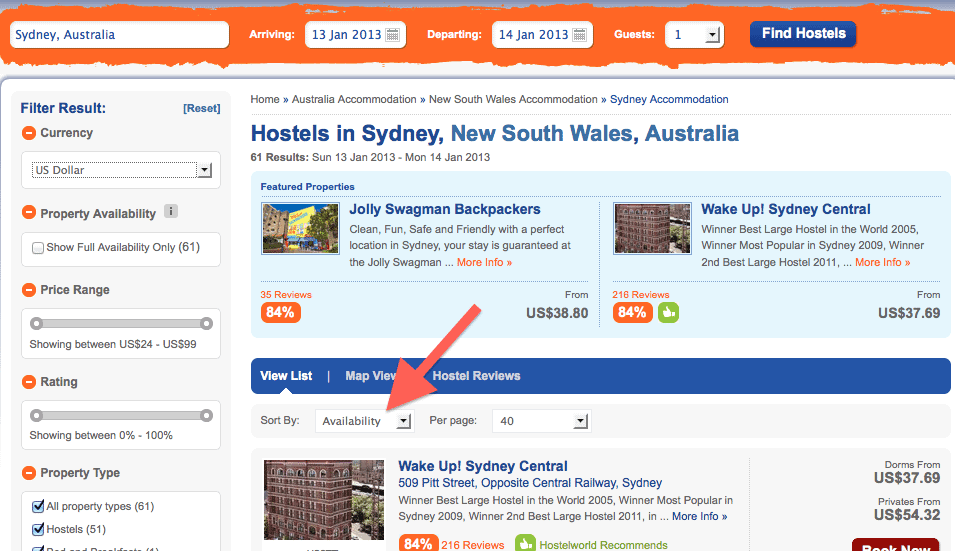 The first thing I do is change the dropdown to Overall Rating. Now we’ve got a look at the best-loved hostels according to hostelworld.com users.
The first thing I do is change the dropdown to Overall Rating. Now we’ve got a look at the best-loved hostels according to hostelworld.com users.
Now the results look like this.
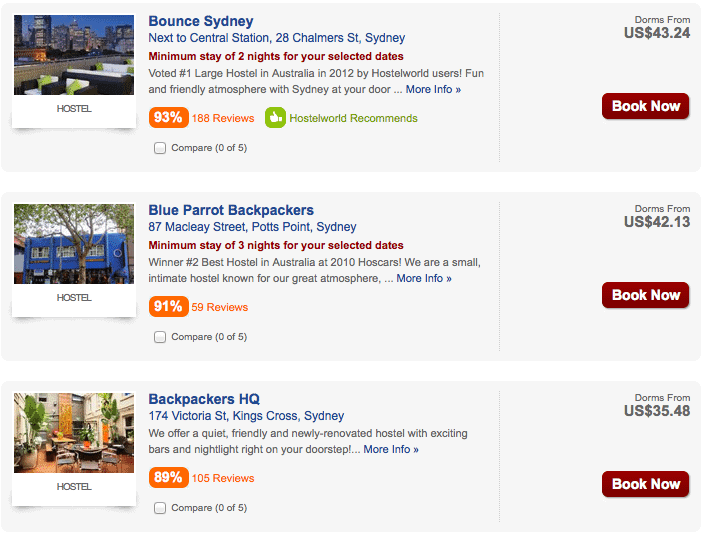 I pretty much ignore the exact rating percentages at this point. Everything near the top of the list is well-liked, so I have to find the right one for me. My own preference is for a packed hostel, a good location, free wifi, a late check-out, any cool extras, and in this case I have a one-night stay, so the first two listed are out because of their stay minimums.
I pretty much ignore the exact rating percentages at this point. Everything near the top of the list is well-liked, so I have to find the right one for me. My own preference is for a packed hostel, a good location, free wifi, a late check-out, any cool extras, and in this case I have a one-night stay, so the first two listed are out because of their stay minimums.
I’ll open up the pages of several hostels on the list, and read the Facilities section of the Info page and the Reviews.
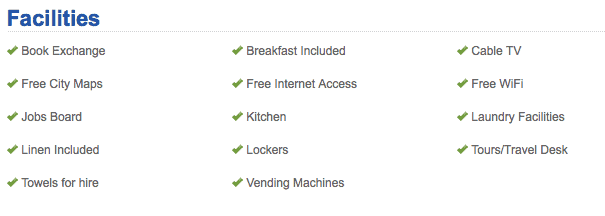 The facilities here note a kitchen and free wifi. Score! Breakfast is included, but I never take advantage of that.
The facilities here note a kitchen and free wifi. Score! Breakfast is included, but I never take advantage of that.
Then I’ll check some of the reviews, which will give me clues about how fun it is and whether the location is good.
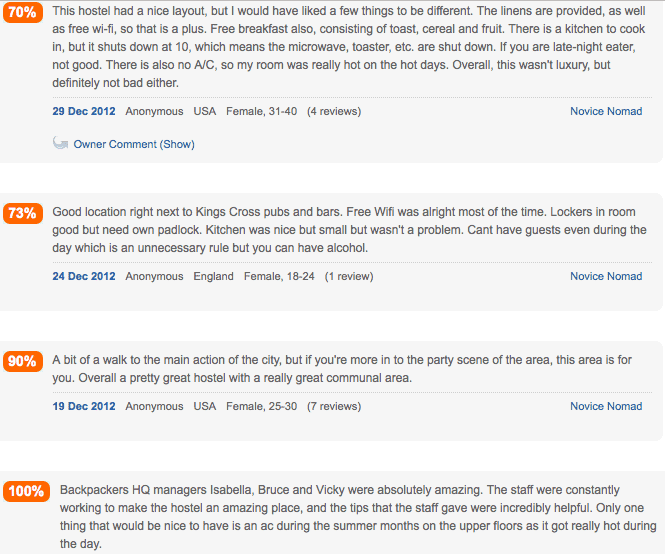 These reviews give a lot of pertinent info: no A/C, kitchen open until 10 PM, close to bars but not the city, can bring your own alcohol.
These reviews give a lot of pertinent info: no A/C, kitchen open until 10 PM, close to bars but not the city, can bring your own alcohol.
Usually searching a few well-rated hostels will result in my being undecided between several choices. In that case, I use my special tie breaker.
Remember the front page where the hostels were listed by which was top rated? There was an even more important detail to me there: the number of ratings.
The hostel with the most ratings is probably the biggest, and for my preferences bigger is better. At the biggest hostels, I have the best chance to meet cool people.
If you prefer quieter hostels, you should choose the hostel with the fewest ratings when in doubt between a few.
Guide Books
I think the worst reference for hostels is guide books. They are outdated when they are released, and they are path dependent. If the last edition reviewed a hostel, this one probably will too even if newer, cooler ones go unreviewed. Word of mouth and Hostel World beat guide books for hostel reviews.
Recap
Hostels are a great place to stay for travelers of all ages who want to meet new people and save money. The best place to get info on the right hostel for you is from someone else’s mouth. The second best place is hostelworld.com. The worst place is a guidebook.
Just getting started in the world of points and miles? The Chase Sapphire Preferred is the best card for you to start with.
With a bonus of 60,000 points after $4,000 spend in the first 3 months, 5x points on travel booked through the Chase Travel Portal and 3x points on restaurants, streaming services, and online groceries (excluding Target, Walmart, and wholesale clubs), this card truly cannot be beat for getting started!
Editorial Disclaimer: The editorial content is not provided or commissioned by the credit card issuers. Opinions expressed here are the author’s alone, not those of the credit card issuers, and have not been reviewed, approved or otherwise endorsed by the credit card issuers.
The comments section below is not provided or commissioned by the bank advertiser. Responses have not been reviewed, approved, or otherwise endorsed by the bank advertiser. It is not the bank advertiser’s responsibility to ensure all questions are answered.


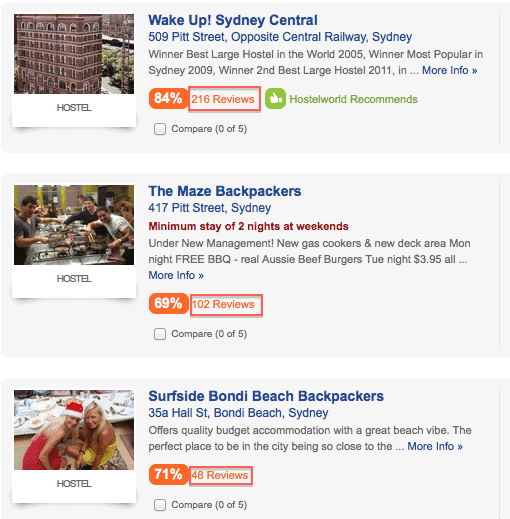

Love this post! As a solo traveler, I think the absolute best play to stay is a private room in a hostel. Otherwise, I’m just staring at the walls of my nice hotel. I started out as backpacker, started staying in hotels and B and B’s as my income grew, and now I’m back to hostels. They’re great for connecting with other travelers.
Love this post! As a solo traveler, I think the absolute best play to stay is a private room in a hostel. Otherwise, I’m just staring at the walls of my nice hotel. I started out as backpacker, started staying in hotels and B and B’s as my income grew, and now I’m back to hostels. They’re great for connecting with other travelers.
I agree. I think hostels will always have a place in my accommodation arsenal no matter my age and income.
We stayed at Wake UP Sydney last year and probably would again.
On our first trip to Europe we didn’t even try any but we traveled the next year with our cousins and tried them and loved it. Our second hostel of the trip in Interlaken Switerzland we met someone from our home town that was great friends with the guy I sat next to at work and was in a wedding party with my sister. Sometimes the world can be a small place!
You meet so many interesting people, so if you are just one or two people traveling it makes for more fun experiences in cities.
I just stayed at Wake Up Sydney last night. Not enough elevators, too expensive for what it was, and the club downstairs made me feel old. Next time in Sydney, I’m going to look elsewhere.
We stayed at Wake UP Sydney last year and probably would again.
On our first trip to Europe we didn’t even try any but we traveled the next year with our cousins and tried them and loved it. Our second hostel of the trip in Interlaken Switerzland we met someone from our home town that was great friends with the guy I sat next to at work and was in a wedding party with my sister. Sometimes the world can be a small place!
You meet so many interesting people, so if you are just one or two people traveling it makes for more fun experiences in cities.
I just stayed at Wake Up Sydney last night. Not enough elevators, too expensive for what it was, and the club downstairs made me feel old. Next time in Sydney, I’m going to look elsewhere.
Will be taking almost the exact same Australia trip this year (on miles of course). And until your twin Australia posts, I would never consider a hostel stay. That is until now. Thank you. Your posts will save me at least $100 per night.
Will be taking almost the exact same Australia trip this year (on miles of course). And until your twin Australia posts, I would never consider a hostel stay. That is until now. Thank you. Your posts will save me at least $100 per night.
How is couchsurfing.com for meeting people? I don’t think I’ll be doing any actual couch surfing, but it looks like it has a meet up section.
Here’s what I would do. If you search a city, a list of people will come up. A lot of them have a coffee icon instead of a couch (or something like that.) That means they are on the site not to host people on their couches but to meet people for coffee and activities. Send them a message and ask them to meet up, show you around, suggest a trip, or something like that.
How is couchsurfing.com for meeting people? I don’t think I’ll be doing any actual couch surfing, but it looks like it has a meet up section.
Here’s what I would do. If you search a city, a list of people will come up. A lot of them have a coffee icon instead of a couch (or something like that.) That means they are on the site not to host people on their couches but to meet people for coffee and activities. Send them a message and ask them to meet up, show you around, suggest a trip, or something like that.
Good to know, thanks! I find that I’m mostly bored only closer to evenings when it’s time to go eat and drink, so this could be convenient.
One of my criteria for choosing is that if it is listed in the LP, I try to avoid it.
Interesting. Why is that?
One of my criteria for choosing is that if it is listed in the LP, I try to avoid it.
Interesting. Why is that?
We like to meet and chat with people who get a little more off the beaten path as opposed to following the LP guidebook tourist trail. Also, at the risk of being politically incorrect, the LP group seems to encompass more of the party animal crowd.
Agree- the better places I’ve stayed have usually NOT been the LP (book) recommended ones. The last one I stayed at was horrendous, dirty, disorganized.
TripAdvisor can be a better source, usually I’ve gotten some great ones (ex- Rambutan Guesthouse on the edge of Albayzin/Sacromonte neighborhoods in Grenada) whose guided me to a great trip ($17/night, and I had a whole room to myself in offseason!). Casa del Parque recently in San Jose CR (their #1 pick) was a mostly good experience (BEAUTIFUL place) but staff was sort of cold, guests anti-social by and large.
I like hostelbookers.com bc theres no service fee or membership fee.
I just came back from Sydney this past week. I stayed at Sydney Railway Square YHA & Sydney Harbour YHA. The Sydney Harbour YHA has a terrace where you can see the Harbour bridge & Opera house. Neither have free wi-fi (hard to find in Australia) but I got a $2/day Optus plan.
I also used a free night voucher on the Inter-Continental Sydney. That was nice.
I like hostelbookers.com bc theres no service fee or membership fee.
I just came back from Sydney this past week. I stayed at Sydney Railway Square YHA & Sydney Harbour YHA. The Sydney Harbour YHA has a terrace where you can see the Harbour bridge & Opera house. Neither have free wi-fi (hard to find in Australia) but I got a $2/day Optus plan.
I also used a free night voucher on the Inter-Continental Sydney. That was nice.
That’s a good tip. I don’t actually use hostelworld.com to book; I just show up in most cases. Wake Up Sydney wanted $7/day for wifi, but after one night there I’m at the Sydney Radisson with a free room and free wifi.
That’s a good tip. I don’t actually use hostelworld.com to book; I just show up in most cases. Wake Up Sydney wanted $7/day for wifi, but after one night there I’m at the Sydney Radisson with a free room and free wifi.
I approve of this message.
Double-like this, since I like hostels too and am also planning to visit Sydney.
My method for using Hostelworld is similar to yours, the first thing I do is filter by overall rating.
I also pay attention to the photos. Usually, they’ll be polished photos of the PRIVATE rooms, but not the dorm rooms. I try to find pictures of the dorm rooms to see where I’d actually be sleeping. The deal-breaker is photos of the bathroom. If the bathrooms and showers look nice, that closes the deal for me. On the flip side, if there are no photos of the bathrooms, I get really suspicious since I’ve been burned in the past. A nice, big common area is a plus.
Reviews have to be taken with a grain of salt. Things I ignore:
“It’s hard to find.” — Many hostels are in apartment buildings and a bit hidden. I don’t mind that a hostel doesn’t have a huge hotel-like sign.
“Noisy.” — If the noise comes from other travelers talking, it’s a hostel, so I expect that. But if the noise is coming from the nightclub next door pounding out beats until 4 a.m., that’s another matter.
“Too small.” — For expensive cities like Hong Kong or Tokyo, those are par for the course.
Things I do pay attention to:
Location. Close to public transport, restaurants and clubs, etc. This makes a big difference to me.
Cleanliness. If this is good, most everything else will fall into place. But if backpackers complain about dirty showers and bedbugs, I stay away.
Friendliness of staff and management. If guests complain about rude staff and management, that’s another red flag.
If hostel staff actively reply to reviews. Few hostels do this, so I give brownie points to any establishment that takes the time to do that.
Wooden bed frames. This is nitpicking, but I like wooden frames for bunk beds over metal ones. Metal bunks are squeaky when someone has to climb on top, and they shake. Wooden bed frames are silent and stable.
Free Internet. I prefer not to lug my laptop around, so it’s nice when a hostel provides free public computers.
Hope you had fun in Sydney! I’m planning to go there.
I liked this post, I learned something. I have never stayed in a hostel…If I was single and traveling alone I definitely would! Yes I will feature it in my “Best Of” category and will ignore your next post;-)
[…] of my cheap stays are at hostels. I’ve written about How I Pick a Hostel. The gist is that hostels are a cheap, social place to stay that are ideal for solo travelers and […]
[…] We spent all five nights at the uninspiringly named Hostel Inn (Salta 309, Bariloche, Argentina). Scott picked it using his hostel picking methods laid out in How I Pick a Hostel. […]
PS- For those Aussie and NZ digs, you well might be better off doing the ol’ couchsurf. For budget travellers like me, those places are mighty expensive ($35-45 for a dorm bed? No thank you!). All of my surfing thus far through CS has been amazing- just check for a compatible type of profile (I haven’t stayed with so many 20-year old partiers for instance). Proper etiquette is to buy your host a drink or meal or something, BTW 🙂
PPS- Nomadic Matt (not a shill for him, I promise!) has frequent gold card memberships to hostelworld for signing up to his email list. They usually are for a month or two but you can just enter in the code the next time you get one of those emails to renew. Good way to save on booking fees, and for me worth the extra couple emails in my inbox.